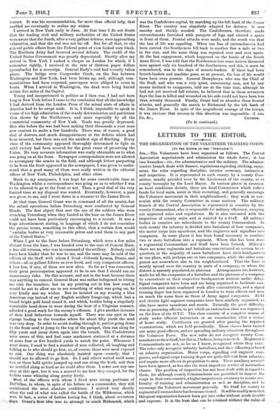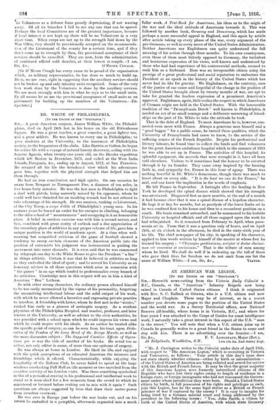LETTERS TO THE EDITOR..
THE ORGANIZATION OF THE VOLUNTEER TRAINING CORPS.
[To THE Berm or " SPECTATOIL1 Snt,—The Volunteers have been organized as follows. The Central Association superintends and administers the whole force ; it has two branches—viz., the administrative and the military. The adminis- trative branch deals with finance, regulations regarding clothing, equip- ment, the rules regarding discipline, interior economy, instruction. and inspection. It is represented in each county by a county Com- mittee, usually presided over by the Lieutenant of the county, or in county boroughs by the Lord Mayor. In various places in counties, as local conditions dictate, there are local Committees which collect funds for local units, assist in their recruiting, and generally encourage the Volunteer movement in their neighbourhood ; they work in con- nexion with the county Committee in some matters. The military branch of the Central Association is represented in counties by the county Commandant, who is responsible for military efficiency, carrying out approved rules and regulations. He is also entrusted with the inspection of county units and is assisted by a Staff. All military bodies in counties are subordinate to the county Commandant. In each county the infantry is divided into battalions of four companies. the motor corps into squadrons, and the engineers and signallers into companies. In some places it has been found necessary to combine two or more battalions into a regiment. Where this has been done a regimental Commandant and Staff have been formed. Althoug'i there are some regiments and battalions concentrated at certain head- quarters, in the majority of cases battalions have their headquarters at one place, with perhaps one or two companies, while the other com- panies are somewhere else in the neighbourhood. Thus the force is mostly spread over the country in units of a company, or where the district is sparsely populated, in platoons. Arrangements are, however, made for all the companies of a battalion and the platoons of a company to concentrate at their respective headquarters without undus delay. Signal companies have been and are being organized to facilitate con- centration and assist combined work after concentration, and a signal training depot has been organized in London to train officers and men on much the same lines as those of Army signal companies. Field and electric light engineer companies have been similarly organized, at also have motor squadrons and scouts. Naturally the great difficulty was in procuring officers, to get which an instruction class was organizei on the lines of the O.T.C. This class consists of a complete course of study under efficient instructors or an examination after a courao of home study. Certificates are granted after passing the required examinations, which are held periodically. These classes have turned out many good officers, and are spreading military education throughout the Volunteer Force. The now rules do not recognize county Com- mandants or their Staff, but this is, I believe, being remedied. Regimental Commandants are not, as far as I know, recognized where they exist. The rules only recognize infantry battalions, and their officering is based on infantry organization. Motor corps, signalling and engineer com- panies, and signal corps training depot are quite different from infantry, and require more officers in proportion to men. These auxiliary services have been ignored, as has also the most important service of instruction classes. The problem of inspection has not been dealt with in regard to them, for although county Commandants are permitted to inspect the corps in their own counties, a higher inspection is necessary to secure uni- formity of training and administration as well as discipline, and to encourage the Volunteer movement generally. No Staff for county or regimental Commandants has been sanctioned. It will be readily seen that this great organization has not been got into order without much trouble and expense. It ie. the least that can be retained without the yalue of the Volunteers as a defence force greatly depreciating, if not wasting away. Of all its branches I fail to see any one that can be spared. Perhaps the local Committees are of the greatest importance, because if local interest is not kept up there will be no Volunteers in a very short time. When corps are not up to the strength laid down by the War Office, they should be provisionally accepted on the recommenda- tion of the Lieutenant of the county for a certain time, and if they don't come up to strength by then, the provisional acceptance of their services should be cancelled. They are now, from the administration. of continued official cold douche; at their lowest st rength.—I am,
[Sir 0' Moore Omagh has every cause to be proud of the organization which, as military representative, he has done so much to build up. He is, we are sine, right in suggesting that the auxiliary services should not be broken up and only infantry units recognized. Some of the very best work dono by the Volunteers is done by the auxiliary services. We are most strongly with him in what he says as to the small units, By all means let us use the provisional acceptance of small units as an instrument for building up the numbers of the Volunteers.—ED. Spectator.]



































 Previous page
Previous page